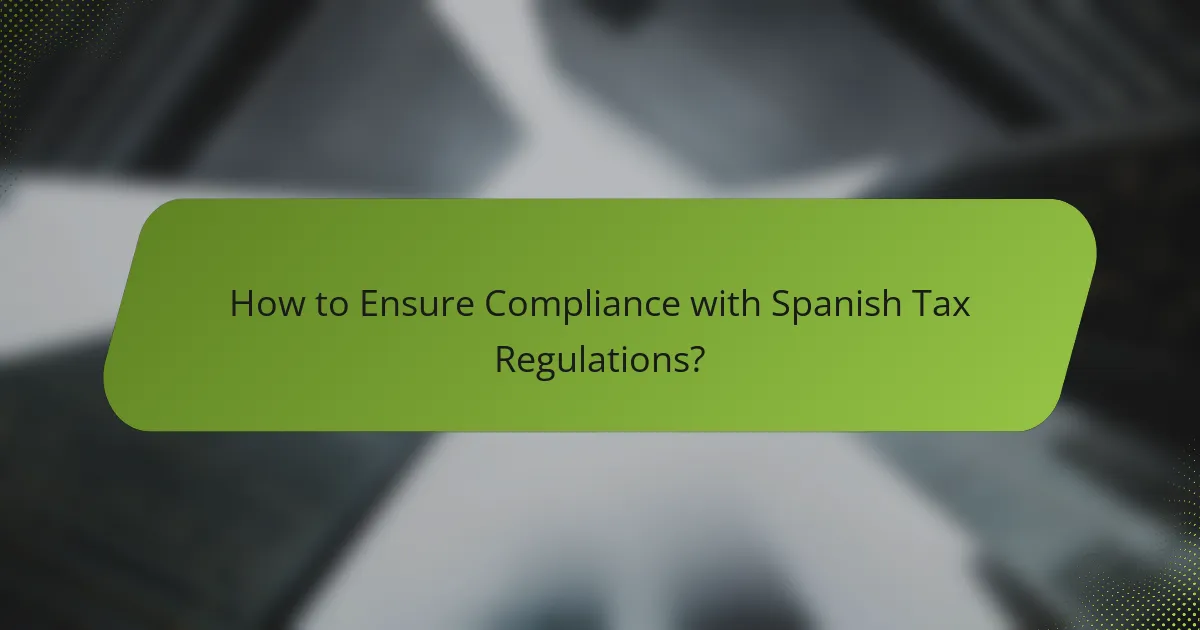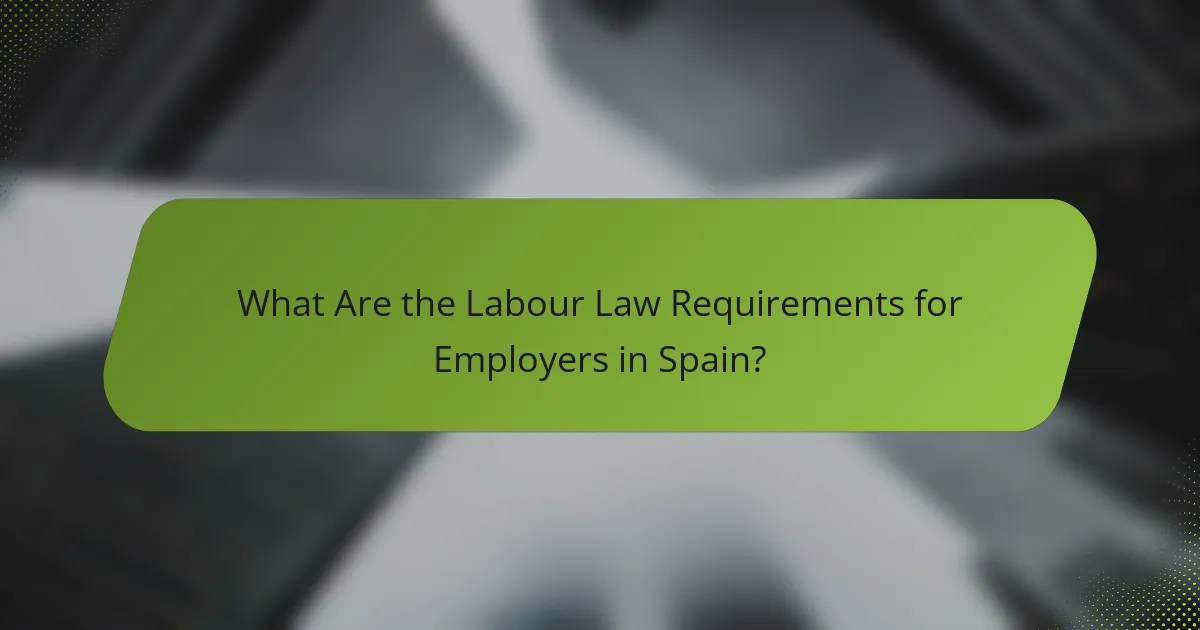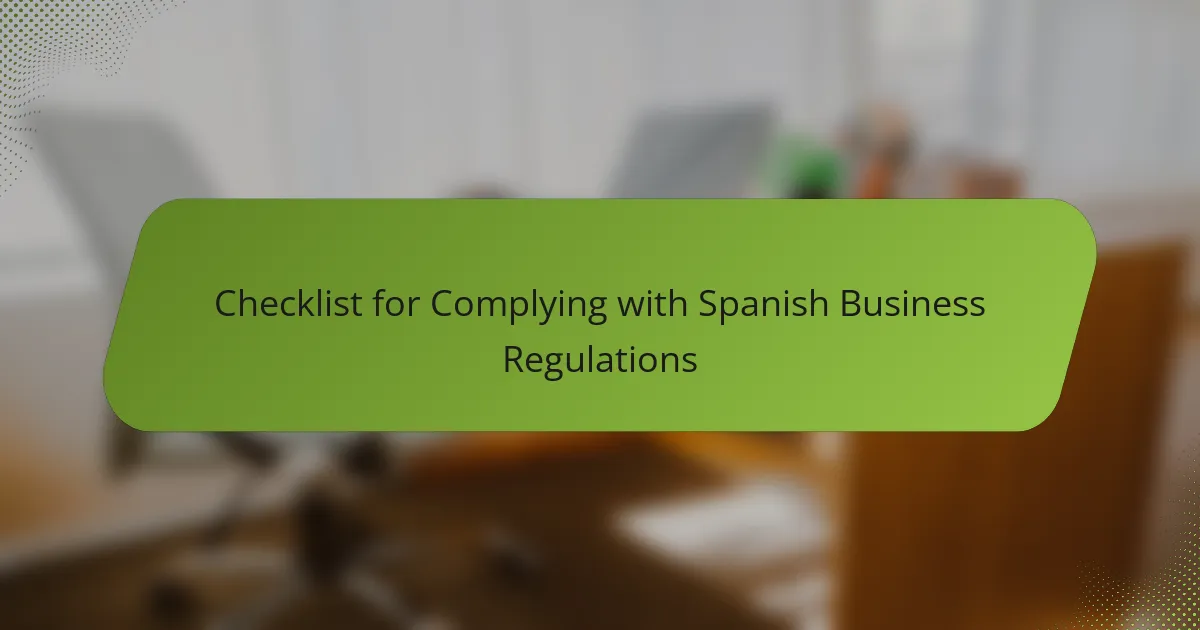Complying with Spanish business regulations is essential for successful operations and involves several key steps. Businesses must register, obtain necessary licences, and understand their tax obligations, labour laws, and health and safety standards. Each requirement varies based on the type of business and its location, making it crucial to stay informed and organised throughout the compliance process.

What Are the Key Steps to Comply with Spanish Business Regulations?
To comply with Spanish business regulations, you must follow several essential steps, including registering your business, obtaining licences, understanding tax obligations, complying with labour laws, and adhering to health and safety standards. Each of these areas has specific requirements that vary depending on your business type and location.
Registering your business
Registering your business in Spain involves several steps, starting with choosing a legal structure, such as a sole proprietorship or limited company. You must then register with the Spanish Tax Agency (Agencia Tributaria) and obtain a tax identification number (NIF).
Additionally, you will need to register your business with the local Commercial Registry (Registro Mercantil) and, in some cases, obtain a municipal licence from your local town hall. Ensure you have all necessary documentation ready to streamline the registration process.
Obtaining necessary licences
Depending on your business activities, you may need specific licences to operate legally in Spain. Common licences include operating permits, health and safety certificates, and environmental permits. The requirements can vary significantly based on the industry.
To avoid delays, research the exact licences required for your business type and location. Consulting with a local expert or legal advisor can help ensure you meet all necessary criteria and avoid common pitfalls.
Understanding tax obligations
Spanish businesses must navigate various tax obligations, including corporate tax, value-added tax (VAT), and income tax for employees. The corporate tax rate generally ranges from 25% to 30%, depending on the business type and size.
It’s crucial to maintain accurate financial records and file tax returns on time to avoid penalties. Consider hiring an accountant familiar with Spanish tax regulations to ensure compliance and optimise your tax situation.
Complying with labour laws
Labour laws in Spain are designed to protect employees’ rights and establish fair working conditions. Businesses must comply with regulations regarding contracts, working hours, minimum wage, and employee benefits. The standard workweek is typically 40 hours, with specific rules for overtime.
Employers are also required to provide employees with a written contract and register them with the Social Security system. Familiarise yourself with these laws to avoid legal issues and ensure a positive workplace environment.
Adhering to health and safety standards
Health and safety standards in Spain are governed by national and European regulations aimed at ensuring a safe working environment. Businesses must conduct risk assessments and implement necessary safety measures to protect employees.
Regular training and updates on health and safety protocols are essential. Non-compliance can lead to fines and legal repercussions, so prioritise creating a culture of safety within your organisation.

What Licences Are Required for Businesses in Spain?
In Spain, businesses typically need several licences to operate legally, including a business activity licence, an opening licence, and any sector-specific permits relevant to their industry. Understanding these requirements is crucial for compliance and successful business operations.
Business activity licence
A business activity licence, or “licencia de actividad,” is essential for any company planning to conduct commercial activities in Spain. This licence ensures that the business complies with local zoning laws and safety regulations.
To obtain this licence, you must submit an application to the local municipality along with documentation detailing your business operations. Processing times can vary, but it often takes several weeks to receive approval.
Opening licence
The opening licence, known as “licencia de apertura,” is required before a business can officially start operating in a physical location. This licence confirms that the premises meet health, safety, and urban planning regulations.
To secure an opening licence, you will need to provide proof of compliance with building codes and safety standards. It is advisable to consult with local authorities early in the process to ensure all requirements are met, as failure to do so can result in delays or fines.
Sector-specific permits
Depending on the nature of your business, you may need additional sector-specific permits. These can include licences for food handling, environmental regulations, or health and safety compliance, among others.
Each sector has its own regulatory body, and the requirements can vary significantly. It is crucial to research the specific permits needed for your industry and ensure they are obtained before commencing operations to avoid legal issues.

How to Ensure Compliance with Spanish Tax Regulations?
To ensure compliance with Spanish tax regulations, businesses must understand and adhere to the requirements for VAT registration, tax return filing, and corporate tax rates. This involves staying informed about deadlines, necessary documentation, and applicable rates to avoid penalties.
Registering for VAT
All businesses in Spain that exceed a certain revenue threshold must register for VAT (Value Added Tax). This registration allows companies to charge VAT on their sales and reclaim VAT on their purchases, which can improve cash flow.
The registration process typically involves submitting an application to the Spanish tax authorities, including details about the business and its activities. It’s crucial to keep accurate records of all transactions to support VAT claims and ensure compliance.
Filing tax returns
Filing tax returns in Spain is mandatory for businesses, typically occurring quarterly or annually, depending on the type of tax. Companies must submit their VAT returns by the end of the month following the end of the quarter or year.
It’s essential to prepare these returns accurately and on time to avoid fines. Many businesses find it helpful to use accounting software or hire a tax professional to ensure compliance with all requirements.
Understanding corporate tax rates
In Spain, the standard corporate tax rate is around 25%, although certain types of companies may benefit from reduced rates. New businesses may qualify for a lower rate during their first two years of operation, which can be a significant financial advantage.
Understanding the nuances of corporate tax rates, including deductions and exemptions, is vital for effective tax planning. Consulting with a tax advisor can help businesses navigate these complexities and optimise their tax obligations.

What Are the Labour Law Requirements for Employers in Spain?
Employers in Spain must adhere to various labour law requirements that ensure fair treatment of employees and compliance with national regulations. Key aspects include employee contracts, minimum wage regulations, and social security contributions.
Employee contracts
In Spain, all employees must have a written contract that outlines the terms of employment. This contract should specify the job role, salary, working hours, and duration of employment, whether it is indefinite or fixed-term.
Employers must provide a copy of the contract to the employee and register it with the Social Security system. Failure to do so can result in penalties and legal complications.
Minimum wage regulations
Spain has established a national minimum wage that employers must pay their employees. As of 2023, the minimum wage is set at approximately €1,000 per month for full-time workers, which is subject to annual reviews.
Employers should ensure that wages comply with this minimum standard and consider any applicable collective bargaining agreements that may set higher wage levels for specific sectors.
Social security contributions
Employers in Spain are required to make social security contributions on behalf of their employees. These contributions fund various benefits, including healthcare, pensions, and unemployment insurance.
The contribution rates vary depending on the employee’s salary and type of contract, typically ranging from around 30% to 35% of the gross salary. Employers should ensure timely payments to avoid fines and ensure employee benefits are maintained.

How Can Businesses Stay Updated on Regulatory Changes in Spain?
Businesses can stay updated on regulatory changes in Spain by regularly consulting official government websites, industry associations, and legal advisors. Engaging with local chambers of commerce and subscribing to relevant newsletters can also provide timely updates on new laws and regulations.
Monitor Official Government Websites
Regularly check websites such as the Spanish Government’s official portal and the Ministry of Industry, Trade and Tourism. These platforms publish updates on legislative changes, compliance requirements, and other essential information for businesses operating in Spain.
Utilising tools like RSS feeds or email alerts from these sites can help ensure you receive immediate notifications about important updates. This proactive approach can prevent compliance issues and fines.
Engage with Industry Associations
Joining industry associations can provide valuable insights into regulatory changes affecting your sector. These organisations often host seminars, workshops, and webinars that discuss compliance strategies and upcoming legislation.
Networking with peers in these associations can also facilitate the sharing of best practices and experiences regarding regulatory compliance, helping businesses stay informed and prepared.
Consult Legal Advisors
Working with legal advisors who specialise in Spanish business law is crucial for understanding complex regulations. They can provide tailored advice based on your specific business needs and help navigate any legal changes that may arise.
Consider establishing a regular consultation schedule to review compliance status and discuss potential regulatory impacts on your operations. This can be particularly beneficial for businesses in sectors with frequent regulatory updates.
Subscribe to Newsletters and Updates
Subscribing to newsletters from legal firms, business consultants, and relevant government agencies can keep you informed about the latest regulatory changes. Many of these newsletters summarise key changes and provide practical advice for compliance.
Look for newsletters that focus on your industry for the most relevant information. This can save time and ensure you are aware of changes that directly impact your business operations.
